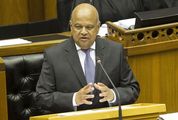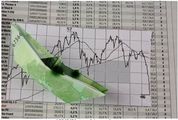IF YOU have already let January’s new year resolutions lapse, consider March an easier time to quit smoking and cut back on alcohol consumption. We’re at the start of a new tax year, meaning government is poised to steel your resolve by raising "sin taxes" next month.
To avoid sliding again, best ignore the Treasury’s infographic in its People’s Guide to the Budget purporting the rise in tobacco and alcohol prices will range only between 6.7% and 8.5%.
The Treasury’s simplified budget (blindly replicated in most newspapers) says this year’s tax hikes will add a mere 11c to a standard 340ml beer can or dumpy, 18c to a 750ml bottle of wine and 82c to a pack of 20 cigarettes.
Sounds reasonable, until you realise the infographic is a masterpiece of prevarication. The Treasury is clearly torn between discouraging unhealthy behaviour and ensuring the additional taxes that smokers and drinkers contribute keep rolling in.
Some vital information obviously missing in the Treasury’s infographic is what the added 11c on beer and so on increases total duties to. Furthermore, the word "duty" is very significant — it skirts around the dark secret that sin taxes are actually double taxes. Government first hikes the price of smokes and booze with duties, and then it slaps its 14% value added tax (VAT) on top of those duties.
Multinational tax experts Deloitte kindly responded to my plea on how to decipher what the sin taxes in last Wednesday’s budget announcement actually translate into.
First, sticking with beer, the 11c added to last year’s excise duty takes the full tax on a 340ml can or dumpy to R1.35, an almost 9% increase. The retail price of what government’s tax table calls "malt beer" varies from about R8 for "brown bottle" brands like Castle and Carling Black Label to R10 for "green bottle" brands like Castle Light and upwards for craft and imported beers.
This means nearly 20% of the pre-VAT price of a brown bottle beer is now government duty, which drops to about 15% for green bottle beer. The fixed duty per bottle regime means cheap beer suffers more than expensive beer, and is therefore likely to suffer more price inflation in April when the new taxes take effect. Except that something the Treasury’s infographic didn’t brag about — which I would have thought worth highlighting in a local election year — is the duty on traditional African beer remains flat at 7.82c/litre, a tenth of the R79.26/litre for malt beer.
Moving on to wine, the new duty is R2.48 per 750ml bottle, which again is a big slice of the price of supermarket plonk but becomes insignificant for very expensive wines. On spirits, duty will become R161.47/litre, although that seems to vary by alcohol content. According to Deloitte, the duty on a 750ml bottle of whiskey containing 43% alcohol will be R52.07, indicating that when you buy a cheap bottle of whiskey, most of the price is tax.
On cigarettes, the total duty will be R13.24 per pack of 20.
I asked Deloitte to confirm the "double sin tax" issue, which was a gripe I heard from a retailer a while back. Kayn Woolmer of Deloitte’s indirect tax team e-mailed this answer: "Excise duty is levied either on production of the relevant product (if it is locally produced) or on importation. So ... when the product is sold by that producer or importer, the excise duty would form part of the cost of the product. The importer/producer would recover all costs (including excise duties) via the selling price (plus a profit, of course). So the excise duty would form part of the selling price. VAT is levied on the full selling price, which means it would effectively be subject to VAT as well."
In other words, once the added duties listed in the Treasury’s infographic have been escalated from wholesale to retail prices, and then had VAT added, the increases in booze and cigarettes will be about double the indicative increases suggested.
Encouraging people to give up drink has been extended to include sugary drinks. Fortunately, you only have to make that one of next year’s tax resolutions.





















Change: 1.41%
Change: 1.74%
Change: 1.55%
Change: 1.65%
Change: 1.42%
Data supplied by Profile Data
Change: 0.58%
Change: -0.08%
Change: 1.41%
Change: 0.00%
Change: -0.31%
Data supplied by Profile Data
Change: 1.48%
Change: 1.89%
Change: 1.88%
Change: 2.33%
Change: 1.64%
Data supplied by Profile Data
Change: -0.58%
Change: -0.42%
Change: -0.39%
Change: -1.22%
Change: -3.05%
Data supplied by Profile Data